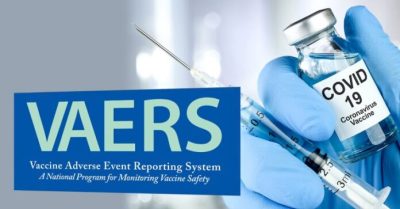Letter from Members of Congress and Senate to US FDA on the EUA of COVID Vaccines for Children 5 Years and Below

All Global Research articles can be read in 51 languages by activating the “Translate Website” drop down menu on the top banner of our home page (Desktop version).
To receive Global Research’s Daily Newsletter (selected articles), click here.
Follow us on Instagram and Twitter and subscribe to our Telegram Channel. Feel free to repost and share widely Global Research articles.
***
The Honorable Robert M. Califf, M.D.
Commissioner
U.S. Food and Drug Administration
10903 New Hampshire Avenue
Silver Spring, MD 20993
Dear Commissioner Califf and Members of VRBPAC,
As the Food and Drug Administration (FDA) reviews the application for Emergency Use Authorization (EUA) of COVID-19 vaccines for approved use in children ages five and under, we believe there are a number of facts to be considered and questions to be asked.
This letter and the questions we raise are focused solely on the youngest of children, those ages five and under as that is the issue before the FDA and perhaps soon before the Centers for Disease Control and Prevention (CDC) for consideration.
Public health officials and Congress recognize the importance of different approaches in addressing health care risk and disease among various populations. We believe our approach to COVID-19 should weigh these various factors as well.
A May 202 CDC study[1] reported that 68% of children 1-4 years of age are SARS-COV2 seropositive—meaning that they have previously had COVID-19. The study also found that for those 5-11 and 12-17, the rates were 77% and 74% respectively. With the Omicron wave in early 2022 and another wave in cases in April and May, it is common sense to presume that these rates are even higher now, with perhaps 80% of children across these age groups being seropositive.
The broad approach of the CDC and FDA to date has been a one-size fits all policy—get the vaccine regardless of age, risk factors, the underlying health of the individual, or previous infection. Yet, to date there remain many unanswered questions about these EUA-approved (COVID-19 vaccines and only a small percentage of the safety data about these vaccines that are in the possession of the FDA and the manufacturers has been released for review.
These mRNA vaccines lack long-term safety studies and may carry unknown long-term risks. Even with respect to near-term acute adverse reactions, the study populations for these vaccines are very small, as it was only with mass vaccinations that the FDA was able to detect serious adverse reactions, particularly among young males.
By its very definition, a one-size-fits-all approach assumes the following: the vaccine is safe and has no unknown long-term adverse effects; that small population studies are sufficient to detect near-term acute adverse reactions among young children; and even without answers to these questions the EUA vaccine is a necessary risk to approve a one-size-fits-all approach to children who have a 99.98%[2] COVID-19 survival rate.
We believe it is prudent and necessary that the FDA provide answers to a number of questions before approving EUA vaccines for children under age 5, including more than 70% of whom are already seropositive for COVID-19.
- Why has the FDA been so slow to release the hundreds of thousands of pages of data from pre-approval manufacturer studies, post-approval adverse events data, other post-approval manufacturer data submitted to the FDA as required by law?
- What is the FDA doing to expedite the release of this data and when can we expect all of the data in the FDA’s possession on these vaccines to be publicly released?
- Should the FDA approve EUA COVID vaccines for children under age 5, will the FDA release the data to the public with 14 days of approval that served as the basis for FDA EUA approval? If not, why not? If not within 14 days, when will the FDA release all of this data to the public?
- When will the FDA and CDC provide the public with more details on those children who have had the most serious adverse outcomes from COVID-19 infections? As of April 2022, the CDC reported 484[3] COVID-related deaths among children ages five and under. According to the CDC there are about 24,000[4] deaths overall in children age s0-5 annually. Each of these deaths is tragic for these families and society. As the FDA and CDC consider COVID vaccine policies, we believe it is important to understand facts related to these COVID-related deaths, including any underlying conditions that may have been a factor in their death. This is important data for parents, health care providers and public health officials so that they can make fully informed decisions about the best health care decision for each child, particularly if the child is seropositive and has no other known risks for adverse outcomes from COVID. It is also noteworthy that as the older population has seen increasing hospitalizations and death with waves of COVID cases CDC cumulative data[5] show significantly less adverse impact on children under age five even during such waves.
- What is the cardiac risk factor in administering these EUA COVID vaccines to children? As COVID vaccines were administered to larger numbers of those ages 5-18, public health officials began to notice a previously unknown risk factor related to cardiac inflammation, pericarditis and myocarditis in particular. Not only have there been a number of deaths but the long-term effects of those who suffered cardiac-related inflammation are as yet unquantified by public health officials.
- Why has the FDA recently lowered the efficacy[6] bar for COVID vaccines for youngest children? This change significantly lowers the expected benefits from any COVID vaccination recommendation for young children and is of particular concern given that over 70% of this age cohort are already seropositive. Recall that when FDA gave EUA approval to COVID vaccines for those ages 16 and older it did so based on data demonstrating over 90%[7] effectiveness in “preventing confirmed COVID infection.” We now know that the efficacy is considerably lower.
- The FDA decided to evaluate effectiveness of this vaccine on a measurement of neutralizing antibodies to the original SARS-CoV2 spike protein. What evidence does FDA have if any that “immunobridging” is an adequate surrogate to the disease prevention metrics used for previous EUAs? Please explain and provide us with FDA data that demonstrates the correlation between immunobridging and disease prevention comparisons between vaccinated and unvaccinated children.
- Is it a possibility that administering the proposed COVID vaccines in young children could predispose them to increased risk from future novel COVID variants? These COVID vaccines were developed using the original SARS-CoV-2 strain and published studies indicate that vaccine efficacy wanes[8] after subsequent doses and as new COVID variants arise in the population.
- World renowned immunologist have raised concerns about the possibility of antibody-dependent enhancement phenomenon[9] (ADE) resulting from COVID vaccines, noting that ADE was a problem in earlier, unrelated COV vaccine trials. What studies has the FDA relied upon when examining the possibility of ADE resulting from EUA COVID vaccines in children ages five and under, or any age group for that matter? Will the FDA affirm with 100% certainty that ADE is not a risk factor for children receiving this vaccine?
- If approved and widely used among children ages five and under how many lives does FDA estimate will be saved in this age group over the next year? Given the injuries reported in the FDA’s own VAERS system, how will the FDA evaluate potential tradeoffs of serious vaccine injuries versus serious COVID outcomes?
- If approved what does FDA estimate will be the cost of administering these vaccines to this age group?
- CDC reports[10] seropositivity of 68% of children 1-4 years, 77% for those 5-11, and 74% children ages 12-17. With two additional COVID waves since this data was reported and corresponding increases in seropositivity, what percentage does FDA consider herd immunity?
- According to the FDA, how many children ages five and under with pre-existing medical conditions have died from COVID or its variants?
- According to the FDA, how many healthy children ages five and under without pre-existing medical conditions have died from COVID or its variants?
- According to the FDA, how many children ages five and under with pre-existing medical conditions have been hospitalized due to (not with) COVID or its variants?
- According to the FDA, how many healthy children ages five and under without pre-existing medical conditions have been hospitalized due to (not with) COVID or its variants?
- According to the FDA, how many children ages five and under with pre-existing medical conditions have required treatment due to COVID or its variants?
- According to the FDA, how many healthy children ages five and under without pre-existing medical conditions have required treatment due to COVID or its variants?
- Please list the medical emergencies of children 0 to 4 years old that enables the FDA to approve the COVID vaccine for children using its EUA.
The data show that the risks of serious adverse outcomes for COVID for children five and under is very low and as such the standard for evaluating EUA interventions must be very high.
We believe each question raised above is not just important, but essential questions for the FDA, VRBPAC and the CDC when it comes to doing a thorough job of evaluating the potential benefits and potential risks of the vaccines for which you have been asked to consider granting an Emergency Use Authorization.
Thank you for your attention to the important questions raised in this letter and we look forward to a timely and thorough response.


*
Note to readers: Please click the share buttons above or below. Follow us on Instagram and Twitter and subscribe to our Telegram Channel. Feel free to repost and share widely Global Research articles.
Notes
[1] https://papers.ssrn.com/sol3/papers.cfm?abstract_id=4092074
[2] https://www.aap.org/en/pages/2019-novel-coronavirus-covid019-infections/children-and-covid-19-state-level-data-report/
[3] https://www.usatoday.com/story/news/nation/2022/05/17/covid-deaths-one-million-united-states/9732932002/
[4] https://www.cdc.gov/nchs/data/nvsr/nvsr70/nvsr70-08-508.pdf
[5] https://www.covid.cdc.gov/covid-data-tracker/#demographicsovertime
[6] https://endpts.com/fdas-peter-marks-to-congress-youngest-kids-vaccine-wont-need-to-hit-50-efficacy-mark/
[7] https://www.fda.gov/media/144416/download
[8] https://www.nejm.org/doi/full/10.1056/NEJMoa2119451
[9] https://www.ncbi.nlm.nih.gov/pmc/articles/PMC8512237/
[10] https://papers.ssrn.com/sol3/papers.cfm?abstract_id=4092074

